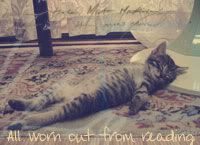Vanity, Thy Name is Andrew
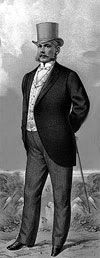 We must now go back to Uncle Andrew. His poor old heart went pit-a-pat as he staggered down the attic stairs and he kept on dabbing at his forehead with a handkerchief. When he reached his bedroom, which was the floor below, he locked himself in. And the very first thing he did was to grope in his wardrobe for a bottle and a wine-glass which he always kept hidden there where Aunt Letty could not find them. He poured himself out a glassful of some nasty, grown-up drink and drank it off at one gulp. Then he drew a deep breath.
We must now go back to Uncle Andrew. His poor old heart went pit-a-pat as he staggered down the attic stairs and he kept on dabbing at his forehead with a handkerchief. When he reached his bedroom, which was the floor below, he locked himself in. And the very first thing he did was to grope in his wardrobe for a bottle and a wine-glass which he always kept hidden there where Aunt Letty could not find them. He poured himself out a glassful of some nasty, grown-up drink and drank it off at one gulp. Then he drew a deep breath."Upon my word," he said to himself. "I'm dreadfully shaken. Most upsetting! And at my time of life!"
He poured out a second glass and drank it too; then he began to change his clothes. You have never seen such clothes, but I can remember them. He put on a very high, shiny, stiff collar of the sort that made you hold your chin up all the time. He put on a white waistcoat with a pattern on it and arranged his gold watch chain across the front. He put on his best frock-coat, the one he kept for weddings and funerals. He got out his best tall hat and polished it up. There was a vase of flowers (put there by Aunt Letty) on his dressing table; he took one and put it in his buttonhole. He took a clean handkerchief (a lovely one such as you couldn't buy today) out of the little lefthand drawer and put a few drops of scent on it. He took his eye-glass, with the thick black ribbon, and screwed it into his eye; then he looked at himself in the mirror.
Children have one kind of silliness, as you know, and grown-ups have another kind. At this moment Uncle Andrew was beginning to be silly in a very grown-up way. Now that the Witch was no longer in the same room with him he was quickly forgetting how she had frightened him and thinking more and more of her wonderful beauty. He kept on saying to himself, "A dem fine woman, sir, a dem fine woman. A superb creature." He had also somehow managed to forget that it was the children who had got hold of this "superb creature": he felt as if he himself by his Magic had called her out of unknown worlds.
"Andrew, my boy," he said to himself as he looked in the glass, "you're a devilish well preserved fellow for your age. A distinguished-looking man, sir."
You see, the foolish old man was actually beginning to imagine the Witch would fall in love with him. The two drinks probably had something to do with it, and so had his best clothes. But he was, in any case, as vain as a peacock; that was why he had become a Magician.
~C.S. Lewis, The Magician's Nephew (1955)
_______________________
Note to the blog: I will be absent next week. My fellow blogger Bob will be providing you with your daily dose of C.S. Lewis. Enjoy!
 What are the key words of modern criticism? Creative, with its opposite derivative; spontaneity, with its opposite convention; freedom, contrasted with rules. Great authors are innovators, pioneers, explorers; bad authors bunch in schools and follow models. Or again, great authors are always 'breaking fetters' and 'bursting bonds'. They have personality, they 'are themselves'. I do not know whether we often think out the implication of such language into a consistent philosophy; but we certainly have a general picture of bad work flowing from conformity and discipleship, and of good work bursting out from certain centres of explosive force--apparently self-generating force--which we call men of genius.
What are the key words of modern criticism? Creative, with its opposite derivative; spontaneity, with its opposite convention; freedom, contrasted with rules. Great authors are innovators, pioneers, explorers; bad authors bunch in schools and follow models. Or again, great authors are always 'breaking fetters' and 'bursting bonds'. They have personality, they 'are themselves'. I do not know whether we often think out the implication of such language into a consistent philosophy; but we certainly have a general picture of bad work flowing from conformity and discipleship, and of good work bursting out from certain centres of explosive force--apparently self-generating force--which we call men of genius. Perhaps it has sometimes happened to you in a dream that someone says something which you don't understand but in the dream it feels as if it had some enormous meaning . . . a lovely meaning too lovely to put into words, which makes the dream so beautiful that you remember it all your life and are always wishing you could get into that dream again.
Perhaps it has sometimes happened to you in a dream that someone says something which you don't understand but in the dream it feels as if it had some enormous meaning . . . a lovely meaning too lovely to put into words, which makes the dream so beautiful that you remember it all your life and are always wishing you could get into that dream again. At that moment Ransom was deafened by a loud sound--a perfectly familiar sound which was the last thing he expected to hear. It was a terrestrial, human and civilized sound; it was even European. It was the crack of an English rifle; and Hyoi, at his feet, was struggling to rise and gasping. There was blood on the white weed where he struggled. Ransom dropped on his knees beside him. The huge body of the hross was too heavy for him to turn round. Whin helped him.
At that moment Ransom was deafened by a loud sound--a perfectly familiar sound which was the last thing he expected to hear. It was a terrestrial, human and civilized sound; it was even European. It was the crack of an English rifle; and Hyoi, at his feet, was struggling to rise and gasping. There was blood on the white weed where he struggled. Ransom dropped on his knees beside him. The huge body of the hross was too heavy for him to turn round. Whin helped him. My own experience in reading the Gospels was at one stage even more depressing than yours. Everyone told me that there I should find a figure whom I couldn't help loving. Well, I could. They told me I would find moral perfection--but one sees so very little of Him in ordinary situations that I couldn't make much of that either. Indeed some of His behaviour seemed to me open to criticism, e.g. accepting an invitation to dine with a Pharisee and then loading him with torrents of abuse.
My own experience in reading the Gospels was at one stage even more depressing than yours. Everyone told me that there I should find a figure whom I couldn't help loving. Well, I could. They told me I would find moral perfection--but one sees so very little of Him in ordinary situations that I couldn't make much of that either. Indeed some of His behaviour seemed to me open to criticism, e.g. accepting an invitation to dine with a Pharisee and then loading him with torrents of abuse.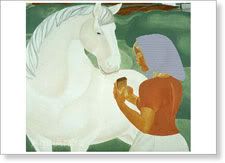 "When I heard the language of men uttered by my mare," continued Aravis, "I said to myself, the fear of death has disordered my reason and subjected me to delusions. And I became full of shame for none of my lineage ought to fear death more than the biting of a gnat. Therefore I addressed myself a second time to the stabbing, but Hwin came near to me and put her head in between me and the dagger and discoursed to me most excellent reasons and rebuked me as a mother rebukes her daughter. And now my wonder was so great that I forgot about killing myself and about Ahoshta and said, `O my mare, how have you learned to speak like one of the daughters of men?' And Hwin told me what is known to all this company, that in Narnia there are beasts that talk, and how she herself was stolen from thence when she was a little foal. She told me also of the woods and waters of Narnia and the castles and the great ships, till I said, `In the name of Tash and Azaroth and Zardeenah Lady of the Night, I have a great wish to be in that country of Narnia.' `O my mistress,' answered the mare, `if you were in Narnia you would be happy, for in that land no maiden is forced to marry against her will.'
"When I heard the language of men uttered by my mare," continued Aravis, "I said to myself, the fear of death has disordered my reason and subjected me to delusions. And I became full of shame for none of my lineage ought to fear death more than the biting of a gnat. Therefore I addressed myself a second time to the stabbing, but Hwin came near to me and put her head in between me and the dagger and discoursed to me most excellent reasons and rebuked me as a mother rebukes her daughter. And now my wonder was so great that I forgot about killing myself and about Ahoshta and said, `O my mare, how have you learned to speak like one of the daughters of men?' And Hwin told me what is known to all this company, that in Narnia there are beasts that talk, and how she herself was stolen from thence when she was a little foal. She told me also of the woods and waters of Narnia and the castles and the great ships, till I said, `In the name of Tash and Azaroth and Zardeenah Lady of the Night, I have a great wish to be in that country of Narnia.' `O my mistress,' answered the mare, `if you were in Narnia you would be happy, for in that land no maiden is forced to marry against her will.'

 "I will not be Ungit," said I. I got up, shivering as with fever, from my bed and bolted the door. I took down my old sword, the very same that Bardia had taught me to use, and drew it. It looked such a happy thing ( and it was indeed a most true, perfect, fortunate blade) that tears came into my eyes. "Sword," said I, "you have had a happy life. You killed Argan. You saved Bardia. Now, for your masterpiece."
"I will not be Ungit," said I. I got up, shivering as with fever, from my bed and bolted the door. I took down my old sword, the very same that Bardia had taught me to use, and drew it. It looked such a happy thing ( and it was indeed a most true, perfect, fortunate blade) that tears came into my eyes. "Sword," said I, "you have had a happy life. You killed Argan. You saved Bardia. Now, for your masterpiece."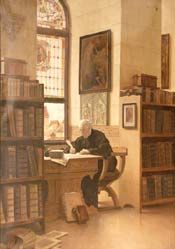 My studies in the XVIth century--you will remember my idea of a book about Erasmus--have carried me much further back than I anticipated. Indeed it is the curse and the fascination of literary history that there are no real beginnings. Take what point you will for the start of some new chapter in the mind and imaginations of man, and you will invariably find that it has always begun a bit earlier; or rather, it branches so imperceptibly out of something else that you're forced to go back to the something else. The only satisfactory opening for any study is the first chapter of Genesis.
My studies in the XVIth century--you will remember my idea of a book about Erasmus--have carried me much further back than I anticipated. Indeed it is the curse and the fascination of literary history that there are no real beginnings. Take what point you will for the start of some new chapter in the mind and imaginations of man, and you will invariably find that it has always begun a bit earlier; or rather, it branches so imperceptibly out of something else that you're forced to go back to the something else. The only satisfactory opening for any study is the first chapter of Genesis.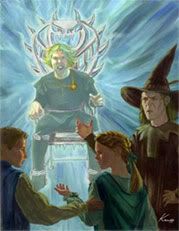
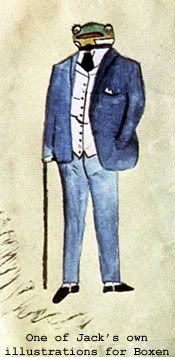 One of the things that C.S. Lewis did at a very early age was invent his own imaginary world called Animal-Land, which evolved into the larger world of "Boxen". At seven years old, he had already written stories and histories involving the animal characters of this world--King Bunny, General Quicksteppe, and others. He even plotted out his nation's steamship routes and railway timetables. These writings have been published as Boxen: The Imaginary World of the Young C.S. Lewis, ed. Walter Hooper (1985). Here is a letter he wrote to his brother Warnie (who was away at boarding school) when he was eight - the spelling and punctuation are his:
One of the things that C.S. Lewis did at a very early age was invent his own imaginary world called Animal-Land, which evolved into the larger world of "Boxen". At seven years old, he had already written stories and histories involving the animal characters of this world--King Bunny, General Quicksteppe, and others. He even plotted out his nation's steamship routes and railway timetables. These writings have been published as Boxen: The Imaginary World of the Young C.S. Lewis, ed. Walter Hooper (1985). Here is a letter he wrote to his brother Warnie (who was away at boarding school) when he was eight - the spelling and punctuation are his: For about a hundred years we have so concentrated on one of the virtues--'kindness' or mercy--that most of us do not feel anything except kindness to be really good or anything but cruelty to be really bad. Such lopsided ethical developments are not uncommon, and other ages too have had their pet virtues and curious insensibilities. And if one virtue must be cultivated at the expense of all the rest, none has a higher claim than mercy--for every Christian must reject with detestation that covert propaganda for cruelty which tries to drive mercy out of the world by calling it names such as 'Humanitarianism' and 'Sentimentality'. The real trouble is that 'kindness' is a quality fatally easy to attribute to ourselves on quite inadequate grounds. Everyone feels benevolent if nothing happens to be annoying him at the moment. Thus a man easily comes to console himself for all his other vices by a conviction that 'his heart's in the right place' and 'he wouldn't hurt a fly', though in fact he has never made the slightest sacrifice for a fellow creature. We think we are kind when we are only happy: it is not so easy, on the same ground, to imagine oneself temperate, chaste, or humble.
For about a hundred years we have so concentrated on one of the virtues--'kindness' or mercy--that most of us do not feel anything except kindness to be really good or anything but cruelty to be really bad. Such lopsided ethical developments are not uncommon, and other ages too have had their pet virtues and curious insensibilities. And if one virtue must be cultivated at the expense of all the rest, none has a higher claim than mercy--for every Christian must reject with detestation that covert propaganda for cruelty which tries to drive mercy out of the world by calling it names such as 'Humanitarianism' and 'Sentimentality'. The real trouble is that 'kindness' is a quality fatally easy to attribute to ourselves on quite inadequate grounds. Everyone feels benevolent if nothing happens to be annoying him at the moment. Thus a man easily comes to console himself for all his other vices by a conviction that 'his heart's in the right place' and 'he wouldn't hurt a fly', though in fact he has never made the slightest sacrifice for a fellow creature. We think we are kind when we are only happy: it is not so easy, on the same ground, to imagine oneself temperate, chaste, or humble. In the middle of the night he opened his eyes and saw the full moon, very large and low, shining at his window: and beside his bed stood a woman darkly clothed, who held up her hand for silence when he would have spoken.
In the middle of the night he opened his eyes and saw the full moon, very large and low, shining at his window: and beside his bed stood a woman darkly clothed, who held up her hand for silence when he would have spoken.
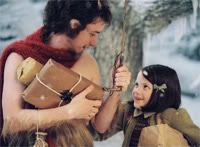 "Good evening," said Lucy. But the Faun was so busy picking up its parcels that at first it did not reply. When it had finished it made her a little bow.
"Good evening," said Lucy. But the Faun was so busy picking up its parcels that at first it did not reply. When it had finished it made her a little bow. 
 It was a wonderful vehicle, blazing with golden light, heraldically coloured. The Driver himself seemed full of light and he used only one hand to drive with. The other he waved before his face as if to fan away the greasy steam of the rain. A growl went up from the queue as he came in sight. 'Looks as if he had a good time of it, eh?...Bloody pleased with himself, I bet...My dear, why can't he behave naturally?--Thinks himself too good to look at us...Who does he imagine he is?...All that gilding and purple, I call it a wicked waste. Why don't they spend some of the money on their house property down here?--God! I'd like to give him one in the ear-'ole.' I could see nothing in the countenance of the Driver to justify all this, unless it were that he had a look of authority and seemed intent on carrying out his job.
It was a wonderful vehicle, blazing with golden light, heraldically coloured. The Driver himself seemed full of light and he used only one hand to drive with. The other he waved before his face as if to fan away the greasy steam of the rain. A growl went up from the queue as he came in sight. 'Looks as if he had a good time of it, eh?...Bloody pleased with himself, I bet...My dear, why can't he behave naturally?--Thinks himself too good to look at us...Who does he imagine he is?...All that gilding and purple, I call it a wicked waste. Why don't they spend some of the money on their house property down here?--God! I'd like to give him one in the ear-'ole.' I could see nothing in the countenance of the Driver to justify all this, unless it were that he had a look of authority and seemed intent on carrying out his job.
 "My friendship you shall have, learned Man," piped Reepicheep. "And any Dwarf - or Giant - in the army who does not give you good language shall have my sword to reckon with."
"My friendship you shall have, learned Man," piped Reepicheep. "And any Dwarf - or Giant - in the army who does not give you good language shall have my sword to reckon with." "Or killed by wild beasts," said Drinian.
"Or killed by wild beasts," said Drinian.  I am progressing along the path of life in my ordinary contentedly fallen and godless condition, absorbed in a merry meeting with my friends for the morrow or a bit of work that tickles my vanity today, a holiday or a new book, when suddenly a stab of abdominal pain that threatens serious disease, or a headline in the newspapers that threatens us all with destruction, sends this whole pack of cards tumbling down. At first I am overwhelmed, and all my little happinesses look like broken toys. Then, slowly and reluctantly, bit by bit, I try to bring myself into the frame of mind that I should be in at all times. I remind myself that all these toys were never intended to possess my heart, that my true good is in another world and my only real treasure is Christ. And perhaps, by God's grace, I succeed, and for a day or two become a creature consciously dependent on God and drawing its strength from the right sources. But the moment the threat is withdrawn, my whole nature leaps back to the toys: I am even anxious, God forgive me, to banish from my mind the only thing that supported me under the threat because it is now associated with the misery of those few days. Thus the terrible necessity of tribulation is only too clear. God has had me for but forty-eight hours and then only by dint of taking everything else away from me. Let Him but sheathe that sword for a moment and I behave like a puppy when the hated bath is over--I shake myself dry as I can and race off to reacquire my comfortable dirtiness, if not in the nearest manure heap, at least in the nearest flower bed. And that is why tribulations cannot cease until God either sees us remade or sees that our remaking is now hopeless.
I am progressing along the path of life in my ordinary contentedly fallen and godless condition, absorbed in a merry meeting with my friends for the morrow or a bit of work that tickles my vanity today, a holiday or a new book, when suddenly a stab of abdominal pain that threatens serious disease, or a headline in the newspapers that threatens us all with destruction, sends this whole pack of cards tumbling down. At first I am overwhelmed, and all my little happinesses look like broken toys. Then, slowly and reluctantly, bit by bit, I try to bring myself into the frame of mind that I should be in at all times. I remind myself that all these toys were never intended to possess my heart, that my true good is in another world and my only real treasure is Christ. And perhaps, by God's grace, I succeed, and for a day or two become a creature consciously dependent on God and drawing its strength from the right sources. But the moment the threat is withdrawn, my whole nature leaps back to the toys: I am even anxious, God forgive me, to banish from my mind the only thing that supported me under the threat because it is now associated with the misery of those few days. Thus the terrible necessity of tribulation is only too clear. God has had me for but forty-eight hours and then only by dint of taking everything else away from me. Let Him but sheathe that sword for a moment and I behave like a puppy when the hated bath is over--I shake myself dry as I can and race off to reacquire my comfortable dirtiness, if not in the nearest manure heap, at least in the nearest flower bed. And that is why tribulations cannot cease until God either sees us remade or sees that our remaking is now hopeless.


